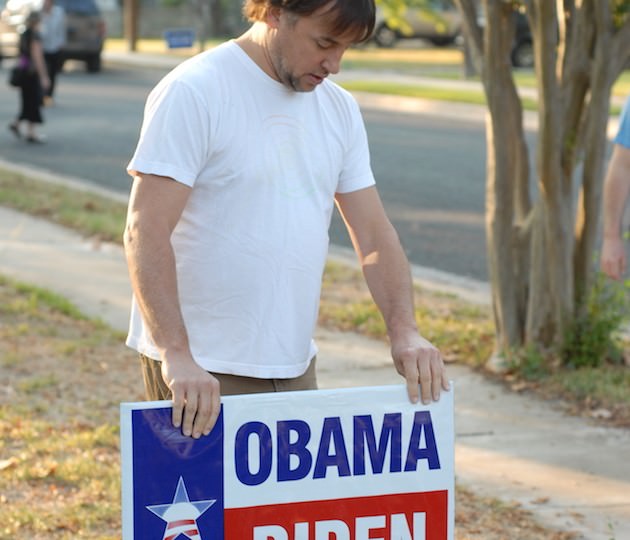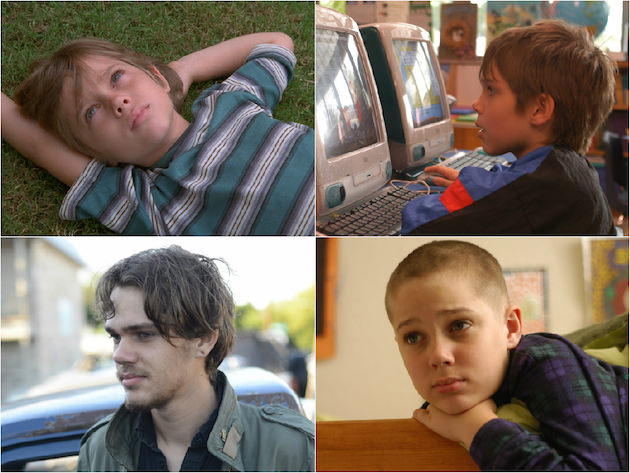Oscar-Nominee Richard Linklater on Playing With Time in Boyhood
There are few filmmakers who have the dedication and patience of Richard Linklater. Boyhood proved that. For those of you who might just be emerging from a cinematic hibernation, here is what you missed; for twelve years, the writer/director returned to the same actors and script to chronicle the fictional story of a boy growing up in Texas. Little-known actor Ellar Coltrane was hired over a decade ago, at the age of six, to take on the lead role while well established actors Ethan Hawke and Patricia Arquette were cast as his parents. Filming began in 2002 and ended in late 2013. The results were spectacular. Upon its release, critics and moviegoers alike lavished the film with praise, and the drama was eventually nominated for six Academy Awards, including best picture, best original screenplay and best director.
Boyhood wasn’t the first time that Linklater had attempted to show onscreen how the nature of time affects people. In his Before trilogy (Before Sunrise, Before Sunset and Before Midnight), Linklater tried to capture the effect that time had on one young couple’s decades-long relationship. Those films— starring Ethan Hawke and Julie Delpy as the couple— were shot years apart from one another with the first arriving in theaters in 1995, the second in 2004 and the third in 2013. The core relationship had undeniably changed over the years. We interviewed the three of them on camera to find out just how they did it.
Boyhood also wasn’t the first time that Linklater showed how dedicated he was to his films and to his subjects. In 2011, he directed a low-budget movie called Bernie, which told the true story of Bernie Tiede, a kind-hearted mortician who befriended and ultimately killed his elderly neighbor. When the film arrived in theaters, Tiede was serving time in prison, but when he was eventually released from prison (after seventeen years), he moved into the apartment above Linklater’s garage.
I conducted a phone interview with Linklater and talked to him about the incredible journey of Boyhood. Below is a slightly edited transcript of our conversation.

First off, where did the impetus for doing a movie over 12 years come from?
Every movie's a story. I'm just trying to tell a story in the appropriate way that I have to express what I'm trying to convey so… [this] was really the only way to tell a story that encompassed all of childhood and parenting and all these years. I'd kind of given up on the idea of making a film about growing up, and then I had this idea of 'why couldn’t you just film a little bit every year. Let everybody fully grow up in age.’ [It] would be an interesting way to tell a story. It was as simple as that—very simple idea— but at the end of it, now I can honestly say I know why no one's done it.
How so?
Well, we got very lucky. Everything worked out as planned. We were able to execute and tell the story but you know, I guess you’re tempting fate in a way but on a more psychic level, I think filmmakers are—we're all control freaks, right? We're trying to bend the realities around us to the will of our stories. You have to be kind of a control person, and to do this film is to give up that ultimate control and admit you're working with a potentially volatile unpredictable co-star, which is the future. Time. You don’t know what could happen. I choose to look at that as exciting…
Was there a certain month you filmed every year?
Every year it was kind of a practical scheduling dilemma about when people were available. Since we finished one year, we’d kind of start thinking of the next year. Then we’d get the band back together and do it again. It was like making twelve different films, really, but there were some crew members who stuck it out the whole way.
Were there any times during the twelve year period where you just felt overwhelmed?
Not really. You couldn't really ever think that way. Once you're committed, you're in. You’ve got to look at it the other way like, ‘God, we were so lucky to have this opportunity that we had the backing to make this film every year.’ It wasn't a burden. It was like a gift. You’ve got to look at it that way. To do a very unusual-on-paper, risky project—you don't get that opportunity that often in this world. I like to make movies where I look up at my collaborators and go, 'How are they letting us do this? Isn’t this cool?’
Not only were you making twelve separate movies in a way, but also you were making them in different cultural moments.
It was fun to work with whatever the culture's doing at a certain time. You just had to shake hands with that, but you didn’t give up that element of control. You know we do that in life. We all have our general plan for the future. We all have our commitments. You try to control and manipulate and maneuver through life…but there's this random element to life that's always throwing things at you that you have to adjust to, so this film was not any different than most people's lives.
What was the greatest concern with casting Ellar, and when did you realize you made the right decision?
I cast him because he was this thoughtful, sensitive, interesting young man. He was cut from nobody's cloth, not from any cookie cutter. He was his own guy. He had cool parents, artists. I thought, ‘Well, this could be kind of an interesting way to go,’ but once you start, you just [think], ‘he's my guy.’ Wherever he goes, the film is going to follow to some— whatever— degree. It was fun. I never thought twice. Now, it’s unimaginable to think of anyone but him in the role. Had it been someone else, maybe there’d be a tonal consistency to some degree but it would be a very different movie.

When you went into the movie, had you already written out the script or did you just have an overall arc that you wanted to follow?
I had an overall arc. I had all the big stuff planned out: they're moving, she's getting a new job, the step parents separate. All that was kinda planned out. I knew the last shot of the movie very early on— that kind of thing— but year to year, it was just fun to have all that gestation time to think about it. The filmmaking process doesn't really allow for it that much. You can't shoot and then just sit and think for a long time. That has no practical utilitarian application in this world.
Were you editing every year or did you just get footage from every year and then go back at the end?
We’d edit what we shot every year. Like I said, it was like twelve separate movies, so we'd shoot and then I would attach that to everything that came before it. It was like this ongoing, ever-expanding movie that was there and available for me to be referencing and thinking about. Even crew members—I would show them the whole film up to a certain moment, just to remind everybody about the tone and the look or something. It was there for anyone who needed to see it
Did you ever change a story based on what Ellar was going through at the time? I saw an article reporting that he had called you about getting an earring.
Ellar, bless him, he was so thoughtful and took the project so seriously as a part of his life that he would call me up just out of the blue and say, ‘Hey, I’m thinking about getting an earring, Is that okay for my character.’ I was like, ‘Yeah, okay. Are guys your age doing that?’ I always told him the character's going to become you to some degree, so at the very beginning of the movie you know that’s not him. That kid’s a lot more normal than Ellar really was. The same with Lorelai. But by the end, that is kind of them to some degree— playing a fictional character— but that's kind of the essence of him sitting up on that mountain. That's him.
You've done a lot of movies with younger people, which goes against the filmmaking rule of ‘don't work with kids or animals.’
Yeah, kids and animals. I've done now too many. (Laughs) No, I like working with kids. I think of it as being a parent. I would’ve never thought so, but starting this movie in ‘02, I enjoyed working with Ellar and Lorelai and I felt I had a sensitivity to it, so I went from shooting the first year of this to making School of Rock. I had a whole cast of 5th graders there. It was unbelievable, and then a few years later, I did the Bad News Bears, so on a number of occasions, I've worked with kids, but I like them.
And you think that it’s easier because you're a father yourself?
It's never easy, but I'd rather work with kids than some prima donna or older actor who doesn't want to work hard. Kids get with the program just like life. They're very adaptable. They kind of want to collaborate. They want to be friends with the others. It's kind of wonderful. You just have to set the tone. I've always enjoyed it.
You did the trilogy Before Sunrise, Before Sunset, and Before Midnight. From when you did the original movie in that series to when you shot the last one, how do you think filmmaking has changed?
I honestly don't think filmmaking has changed. It's kind of like, ‘How has literature changed? How has painting changed?’ It changes in subtle ways but the core of it— the absolute core of narrative storytelling— it's the same. Boyhood, in a way, is an old-school undertaking. We shot on film. It could be any time in the history of film. Post-production, however, the digital goodies that are out there— technically I love that because it just makes it easier and more practical.
We always joked in the early years, ‘Oh, there's a mic reflection in the window back there, we gotta shoot again,’ and I would just say ‘We’re on a low budget. We’re on a schedule. We’ve got a tight schedule. You know what? We're moving on. Twelve years from now, we're just gonna be able to paint that out really easily digitally,’ and everyone would laugh because I said that probably about four times a day on the set. In the future, we'll just be able to fix that. Let’s keep going. But it happened. The crew was even making a joke. There'd be a mistake, like an actor would flub a line or something, and someone’d say, ‘In the future we can just digitally recreate that performance.’
But on the little technical things, it's absolutely true. That did come to pass as I knew it would and film didn't go away as I knew it wouldn't but those two things did kind of meet in the middle. Film is becoming much more of a rarity to originate on film stock. And digital technology— I see it as our friend. It's really kind of amazing what you can do.
The technology changed so massively while you were filming this, what kind of direct impact did that have on Boyhood?
For instance, I had an NFL poster in the background of a bowling alley location from year two. Eleven years in the past, we shot this thing and the NFL wouldn't give us the rights to use the poster and I need to lock picture. We're done and we've locked picture. We're finishing the film in like two days and the legal thing won't clear it because we don't have the rights to the poster, so I'm like, ‘Ah, screw it.’ We went in for nothing practically. My colorist primer and effects guy, he just faded out that poster and put in something else there. In the 90s, that would've cost 35,000 dollars and taken three weeks.
What was your experience when you were showing the final film to Ethan or Patricia or Ellar for the first time?
Well, it was very different for Ethan and Patricia. They were adults. They made an adult decision… They were really amazed and happy and all that but the kids were in a whole different position. They were so young. Ellar has no memory really of committing to this film. It was just something a little kid wanted to do but to be held to that for twelve years. It's not a documentary about them. They're playing a fictional character, but it's them. That's what they look like in 2006 and 2008. It’s like seeing a warts and all portrayal of yourself at different phases in your life. It's magical in a way, but it can really be a little unnerving, too, so I told Ellar to watch it alone. Watch this movie alone as much as you have to. You’ve got to build your own relationship with this thing, because they hadn't seen dailies or anything. They hadn't seen a frame of film.They were gonna be dredging up the past in a certain way. Ellar said he watched it about three times alone, and he cried a lot. Just the emotions that swept over him. How interesting. Y'know, crazy?



